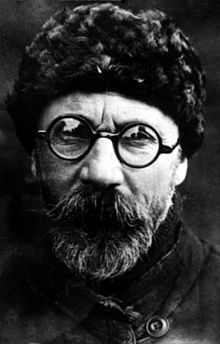Leonid Kulik Honors References External links Navigation menuThe Biographical Encyclopedia of AstronomersIn Siberia in 1908 a huge explosion came out of nowhereVirtual Exploration Society: Leonid KulikШышанаў В. У пошуках «беларускага дзіва» // Культура. 2002. №14. 13-19 красавіка. С.14.no000291764384044943840449
1883 births1942 deathsRussian mineralogistsRussian military personnel of the Russo-Japanese WarRussian military personnel of World War ISoviet military personnel of World War IISoviet prisoners of warSaint Petersburg Forestry Institute alumniPeople from TartuDeaths from typhus
RussianRussianmineralogistmeteoritesTartuEstoniaImperial Forestry InstituteSaint PetersburgKazan UniversityRusso-Japanese WarWorld War ITomskTunguska eventimpact eventNikolay Ivanovich FedorovWorld War IIGerman armyprisoner of wartyphus
Leonid Kulik
Jump to navigation
Jump to search
Leonid Kulik | |
|---|---|
 | |
| Born | 19 August 1883 |
| Died | 24 April 1942(1942-04-24) (aged 58) |
| Nationality | Russian |
| Known for | meteorites, discovery of Tunguska blast site |
| Scientific career | |
| Fields | Mineralogy |
Leonid Alekseyevich Kulik (Russian: Леонид Алексеевич Кулик; 19 August 1883 – 14 April 1942) was a Russian mineralogist who is noted for his research into meteorites.
He was born in Tartu,[1]Estonia, and was educated at the Imperial Forestry Institute in Saint Petersburg and the Kazan University. He served in the Russian military during the Russo-Japanese War, then spent some time in jail for revolutionary political activities. He then served with the Russian military during World War I.
Following the war he became an instructor, teaching mineralogy in Tomsk. In 1920 he was offered a job at the Mineralogical Museum in St. Petersburg.
In 1927, he led the first Soviet research expedition to investigate the Tunguska event,[2][3] the largest impact event in recorded history, which had occurred on 30 June 1908. He made a reconnaissance trip to the region, accompanied by Nikolay Ivanovich Fedorov and others, and interviewed local witnesses. He circled the region where the trees had been felled and became convinced that they were all turned with their roots to the center. However he did not find any meteorite fragments from the impact.
During World War II he again fought for his country, this time in a paramilitary militia. He was captured by the German army and died in a prisoner of war camp of typhus.[4]
Honors
Asteroid 2794 Kulik is named for him.- The crater Kulik on the Moon is named after him.
References
^ Hockey, Thomas (2009). The Biographical Encyclopedia of Astronomers. Springer Publishing. ISBN 978-0-387-31022-0. Retrieved August 22, 2012..mw-parser-output cite.citationfont-style:inherit.mw-parser-output .citation qquotes:"""""""'""'".mw-parser-output .citation .cs1-lock-free abackground:url("//upload.wikimedia.org/wikipedia/commons/thumb/6/65/Lock-green.svg/9px-Lock-green.svg.png")no-repeat;background-position:right .1em center.mw-parser-output .citation .cs1-lock-limited a,.mw-parser-output .citation .cs1-lock-registration abackground:url("//upload.wikimedia.org/wikipedia/commons/thumb/d/d6/Lock-gray-alt-2.svg/9px-Lock-gray-alt-2.svg.png")no-repeat;background-position:right .1em center.mw-parser-output .citation .cs1-lock-subscription abackground:url("//upload.wikimedia.org/wikipedia/commons/thumb/a/aa/Lock-red-alt-2.svg/9px-Lock-red-alt-2.svg.png")no-repeat;background-position:right .1em center.mw-parser-output .cs1-subscription,.mw-parser-output .cs1-registrationcolor:#555.mw-parser-output .cs1-subscription span,.mw-parser-output .cs1-registration spanborder-bottom:1px dotted;cursor:help.mw-parser-output .cs1-ws-icon abackground:url("//upload.wikimedia.org/wikipedia/commons/thumb/4/4c/Wikisource-logo.svg/12px-Wikisource-logo.svg.png")no-repeat;background-position:right .1em center.mw-parser-output code.cs1-codecolor:inherit;background:inherit;border:inherit;padding:inherit.mw-parser-output .cs1-hidden-errordisplay:none;font-size:100%.mw-parser-output .cs1-visible-errorfont-size:100%.mw-parser-output .cs1-maintdisplay:none;color:#33aa33;margin-left:0.3em.mw-parser-output .cs1-subscription,.mw-parser-output .cs1-registration,.mw-parser-output .cs1-formatfont-size:95%.mw-parser-output .cs1-kern-left,.mw-parser-output .cs1-kern-wl-leftpadding-left:0.2em.mw-parser-output .cs1-kern-right,.mw-parser-output .cs1-kern-wl-rightpadding-right:0.2em
^ Siberian Apocalypse (H2--History Channel; Nov. 2, 2011)
^ In Siberia in 1908 a huge explosion came out of nowhere
^ http://www.unmuseum.org/kulik.htm
External links
Virtual Exploration Society: Leonid Kulik at www.unmuseum.org- Шышанаў В. У пошуках «беларускага дзіва» // Культура. 2002. №14. 13-19 красавіка. С.14.
Categories:
- 1883 births
- 1942 deaths
- Russian mineralogists
- Russian military personnel of the Russo-Japanese War
- Russian military personnel of World War I
- Soviet military personnel of World War II
- Soviet prisoners of war
- Saint Petersburg Forestry Institute alumni
- People from Tartu
- Deaths from typhus
(window.RLQ=window.RLQ||[]).push(function()mw.config.set("wgPageParseReport":"limitreport":"cputime":"0.300","walltime":"0.415","ppvisitednodes":"value":1488,"limit":1000000,"ppgeneratednodes":"value":0,"limit":1500000,"postexpandincludesize":"value":18462,"limit":2097152,"templateargumentsize":"value":1170,"limit":2097152,"expansiondepth":"value":12,"limit":40,"expensivefunctioncount":"value":3,"limit":500,"unstrip-depth":"value":1,"limit":20,"unstrip-size":"value":4191,"limit":5000000,"entityaccesscount":"value":1,"limit":400,"timingprofile":["100.00% 376.081 1 -total"," 37.76% 142.003 1 Template:Infobox_scientist"," 35.21% 132.419 1 Template:Infobox_person"," 27.28% 102.579 2 Template:Infobox"," 25.71% 96.706 1 Template:Reflist"," 24.44% 91.907 1 Template:Refimprove"," 22.93% 86.234 1 Template:Cite_book"," 19.07% 71.703 1 Template:Ambox"," 10.89% 40.948 1 Template:Authority_control"," 7.64% 28.747 1 Template:Find_sources_mainspace"],"scribunto":"limitreport-timeusage":"value":"0.160","limit":"10.000","limitreport-memusage":"value":3949164,"limit":52428800,"cachereport":"origin":"mw1268","timestamp":"20190331054122","ttl":2592000,"transientcontent":false);mw.config.set("wgBackendResponseTime":100,"wgHostname":"mw1240"););